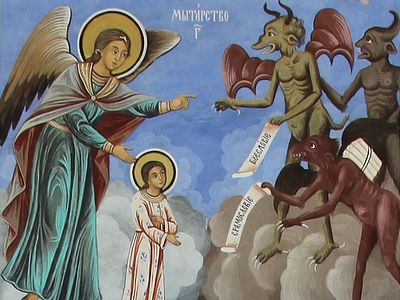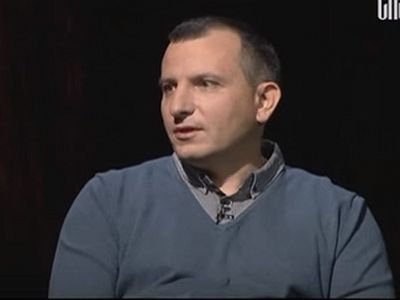See Conversation 1: What happens to the soul after death?
See Conversation 2, Part 1: The Bible on the aerial tollhouses
See Conversation 2, Part 3: Patristic testimony on the tollhouses: the Eastern fathers
See Conversation 2, Part 4: Patristic testimony on the tollhouses: the Western Fathers
I remind the reader that the apocatastasis (ἀποκατάστασις) is the teaching that everyone will be saved. Truly, certain holy fathers believed in this teaching, which was condemned at the Second Constantinople Council (Fifth Ecumenical Council of 553). At the same Council, the anathema was pronounced against all Origenists: “If anyone should say or think that the punishment of the demons and the impious is temporary and will come to an end after a certain time, or that there will be an apocatastasis of the demons and the impious, may he be separated from the community of the faithful (Anathema).
Let’s try to understand why certain fathers of the Church, such as St. Gregory of Nyssa, preached this heresy and why they were not pronounced heretics themselves.
First of all, a heretic is not a person who expresses heretical opinions, but one who even after being exposed as in error by Christ’s Church continues to stubbornly hold to heresy and does not cease spreading it.
Departure from the truth happens when tradition is not tested by Scripture, and either theologumen (personal theological opinion) or outright heresy is accepted as Holy Tradition.1
In the New Testament it says, As newborn babes, desire the sincere milk of the word (1 Pet. 2:2). Why is the Bible compared to milk? Because an infant does not eat bread, or meat—an infant does not take anything for food but milk. And the holy fathers perfectly understood the difference between Holy Scripture and all the other writings, including their own. For example, Blessed Augustine wrote, “Only those books of the Bible are so illustriously called canonical that we believe that the authors of these books sinned in no way against the truth. As for other writers whose works I have read, I surmise that not everything in their works is truth; for no matter what scholarship and sanctity they have achieved, it is nonetheless their own writing and thought.”2
Holy Righteous John of Kronstadt even more categorically expressed his thoughts on this matter: “Holy Scripture is the realm of Mind, Word, and Spirit—the God of the Trinity. In it He is clearly manifested: The words that I speak unto you, they are spirit, and they are life (6:63), said the Lord; the writings of the holy fathers is again the expression of the hypostases of Thought, Word, and Spirit, now with great participation of the human spirit; the writings of ordinary secular people are the manifestations of fallen human spirit, with its sinful attachments, habits, and passions.3
Therefore, when we hear about milk we at once imagine the whiteness of milk. Purity—because the word of God has never been spoken according to human will, but was spoken by Godly men moved by the Holy Spirit; thus it is written in the Scriptures. And we recognize the special holiness of the Bible, the books of the New and Old Testaments—this is the word of God, this is Holy Scripture!
The fathers sometimes expressed certain theologumeni, with which we cannot agree. For example, certain fathers prayed for the salvation evil spirits, the devil—as St. Gregory of Nyssa prayed, for example. And there are other theologumeni.
The Church’s clearest view of this problem was expressed by St. Barsanuphius the Great. Let’s turn to his book, Saints Barsanuphius and John, Guidance Toward Spiritual Life in Answers to Questions From Disciples.
Question 610. The same St. Gregory of Nyssa says that the torments will be eased and finally ended. So, tell me, my father, why such a person does not speak rightly, as is fitting for a holy man who was found worthy to converse according to (the suggestion) of the Holy Spirit. Certain fathers and teachers are also not in agreement about Paradise… And in other chapters of Scripture one can find certain disagreement. We ask you, master, to explain this to us…
Barsanufius’s answer: Hear what God revealed to me three days before you wrote me your question… Do not think that people, although they may be saints, can perfectly fathom all the depths of God; for the apostle says, For we know in part, and we prophesy in part (1 Cor. 13:9)… The saints who were made teachers, either by themselves or forced into this by other people, made great progress, surpassed their own teachers, and having received confirmation from above, expounded new teaching; but at the same time they preserved what they had received from their former teachers—that is, wrong teaching. Subsequently progressing and becoming spiritual teachers, they did not pray to God that He reveal to them regarding their first teachers, whether what they taught was inspired by the Holy Spirit; but instead out of honor for them as wise and intelligent, they did not research their words. In this way the opinions of their teachers mingled with their own teaching, and these saints sometimes spoke what they had learned from their teachers, and sometimes what they had beneficially achieved through their own minds. Consequently, both the former and the latter words were ascribed to them. Having received from others, progressed and become better, (the saints) by the Holy Spirit spoke what was entrusted to them with confirmation from Him (the Holy Spirit); They spoke also what had been taught to them by former teachers, without researching their words as they should have, through prayer to God and asking (those enlightened by the Spirit) to prove whether they are true or not. Thus were the teachings mixed together, and everything that these holy men said was ascribed to their names. Therefore, when you hear that one of them says of himself that he speaks what he heard from the Holy Spirit, then this is beyond doubt and we should believe it. If the (holy man) expounds the above-mentioned (opinions), then you don’t find that he substantiated his words as having confirmation from above but proceeded from the teachings of his former teachers, and trusting their knowledge and wisdom did not ask God whether or not it is true.4
Question 611. Why did God allow such men to have incorrect opinions, even if they did not ask for understanding concerning them? Why wasn’t understanding given to them freely in order to avoid the harm that those who read them might receive? For although they themselves did not stumble upon the right faith or virtues, but like me, who am weak and lazy, believing them without challenging them, can easily receive in ignorance the harm you mentioned, that even the saints could not fathom all the mysteries and that they did not pray to God for confirmation as to whether they were right (opinion or not).
Answer: God did not abandon such men in error, for he leaves (others) in error who ask about the way, but do not speak truth. The saints did not ask God about this, in order to learn the truth from Him. If you say, why did God not prevent in this Him through His grace for the benefit of others who will later read their writings, then you can ask the same about any sinner: Why doesn’t God prevent him with His grace when He knew that he would tempt many by his sins and many will receive harm through him? If this were the case then human life would not be free, but injured by coercion. And who can prevent God from saving any man in the same way? What—aren’t there expressions in the Scripture that people also stumble upon since they are ignorant or without understanding of the spiritual meaning of the Scripture? Should we ask why God didn’t reveal to everyone the spiritual (meaning) of the Scripture, so that people would not receive harm? Instead He left it to the saints living in different times to labor in explaining what is needed. This is why there are teachers and exegists, as the apostles says (cf. 1 Cor. 12:28:30)… The Lord showed us the path of life through the prophets and apostles, although each of them spoke privately, and God did not speak exclusively through one of them, but what one omitted was by God’s will spoken by another. This is what God has wrought with the saints who came after them—what one says doubtfully the next explains, so that God would always be glorified through His saints.5
Holy Patriarch Photius also gives an Orthodox evaluation of erroneous opinions found in the holy Fathers: “There could have been any number of difficult situations that forced many fathers to express themselves in part inexactly, in part applicable to the circumstances of attacks from enemies, or out of human ignorance into which even they might have fallen? If others have spoken inexactly, or because of some reason unknown to us even strayed from the straight path, but there was no investigation and no one called them to a more complete knowledge of the truth, we leave them among the number of fathers as if they had not said it, partly for their illustrious life and the glory of their virtues, and partly for the purity of their faith in other respects. But we shall not follow those words in which they erred.6
St. Mark of Ephesus, speaking about those errors present in the teachings of St. Gregory of Nyssa, notes: “There is a great difference between what is written in the canonical Scriptures and Traditions of the Church and what was written by teachers on a personal basis, or even their teachings. Thus, we should believe the former as given by God… but we should not unconditionally believe the latter or accept it without research. For it is possible that someone is a teacher, but does not say everything absolutely correctly. For what need would the holy fathers have for the Ecumenial Councils if none of them could possibly depart from the truth in anything? Dionysius, Bishop of Alexandria,7 and Gregory the Wonderworker8 slipped into this to a certain extent—even though one of them received a martyr’s crown, and the other’s name alone is enough to inspire praise.”9
Nevertheless, there is such a concept of “the agreement of the fathers”. Agreement of the fathers is the teaching of the Church that has always been everywhere based on Holy Scripture. Thus, we test Holy Tradition with Holy Scripture, but we determine the canon of Holy Scripture itself—which books are canonical and which are not—based on Holy Tradition. Therefore these understandings are very close; but it goes without saying that the Word of God (the Bible) takes absolute priority. It is written, We have also a more sure word of prophecy; whereunto ye do well that ye take heed, as unto a light that shineth in a dark place, until the day dawn, and the day star arise in your hearts: Knowing this first, that no prophecy of the scripture is of any private interpretation. For the prophecy came not in old time by the will of man: but holy men of God spake as they were moved by the Holy Ghost (2 Pet. 1:19-21).
See Conversation 3: The Aerial Tollhouses. The First: Idle Talk





